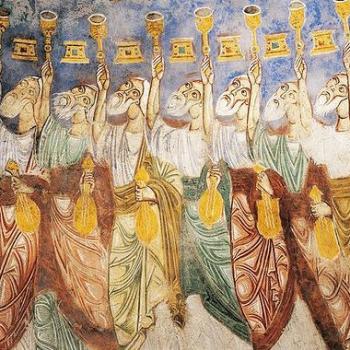Guest Post by John Inglis Re: Carl Trueman’s First Things article “A Church for Exiles”
From Roger Olson: I agree with those who have suggested that frequent commenter John Inglis is an excellent and insightful writer. I asked him to work one of his recent comments into a guest post for this blog and below is his response. I couldn’t have said it better myself.
Carl Trueman’s “A Church for Exiles” and Roger Olson’s response are worth working through carefully: if Christianity is at the margins, and is a church in exile, then how we deal with that issue is very important. Consequently, I contributed a number of responding posts to professor Olson’s lead post. In my posts I have tried to elaborate on what I see as deficiencies in Trueman’s approach to being a church in exile as well as point to other theological traditions (particularly anabaptist) which have riches that are needed by a church in exile. In what follows I discuss two further inadequacies of Trueman’s article.
The two additional inadequacies seem endemic to Reformed responses because they appear to be blind spots in Reformed theologizing. First is an overly heavy emphasis on the Bible / the Word. Second is an un-nuanced and kneejerk use of historical (i.e., dead) Reformed theologians. Before I address those two matters, however, I do want to acknowledge that Reformed theologians themselves can be and have been insightful and critical of their own church. For example, in Nazi Germany Karl Barth wrote, “For the millions that suffer unjustly, the Confessing Church does not yet have a heart. When it speaks, it speaks only about its own affairs.” I note that Barth’s words are applicable to more than just that period of time.
Trueman’s emphasis on “the Word” and his lack of emphasis on Jesus bothers me quite a bit—and more each time I read his article. Trueman writes that the church draws its strength from, ” the Bible, expounded week by week in the proclamation of the Word and taught from generation to generation by way of catechisms and devotions” and corporate performance of that “Word” in liturgy. Throughout his article, Trueman unreflectively uses “Word” with reference to the Bible as if that is its only reference. But for New Testament writers the Word is primarily Jesus.
It is Jesus as the Word who saves us; the Word that was in the beginning and which was God (Jn. 1). “[A]nd you do not have his [the Father’s] word abiding in you, for you do not believe the one whom he has sent. You search the Scriptures because you think that in them you have eternal life; and it is they that bear witness about me, yet you refuse to come to me that you may have life (Jn 5:38f., not the contrast between Word and Scripture). It is Jesus who saves by joining of us to him as a branch is to a vine, so that we share in the indwelling Spirit (Jn. 15).
Does Paul write that he preaches the Bible (the OT)? No. What does Paul write? “I preach Christ crucified” (1 Cor. 1:23). He and the other writers focus on Jesus, on the good news of Jesus Christ—the gospel. It is not the Bible that saves, but Jesus. Of course Paul will refer to the witness of scripture to support his argument (1 Cor. 1:19, 34) and he does correctly note that people must hear about Jesus in order to be saved (Rom. 10:14, 1 Tim. 4:13), but Scripture is not life in and of itself.
The automatic emphasis and primacy of Trueman’s references to the “Word” (a.k.a. Bible) strikes me as symptomatic of scholasticism, which has been a perennial problem of the Reformed. I am reminded of T.F. Torrance’s stories of encounters with people who asked him, “is God really like Jesus?” That repeated question greatly troubled him, and drove part of how he worked out his ministry of Christ to others. That question is the sort that comes out of a church that is too scholastic and too confident in its theological answers, and not sufficiently focussed on Jesus and on his very practical commands to live out true religion.
On this first point I give the last word to Swiss Reformed theologian Barth who was quite critical of the church of his time and found himself increasingly Christocentric (I think it significant that Trueman does not refer to Barth): “I suddenly realized that I could not any longer follow either their ethics and dogmatics or their understanding of the Bible and of history. For me at least, 19th-century theology no longer held any future” (“The Humanity of God”).
With Barth’s critical abandonment of older theologians, I turn now to Truman’s unuanced blanket approval of Puritan theology, and his implicit assumption that if we returned to that theology we would have the wisdom, knowledge and strength to live in exile. But while there is good in Puritan theology and theological writings, there are also great and grave defects. These defects warrant developing a new theology for our time in exile, a theology that draws on other faith traditions that actually spent all or most of their time in exile (I’m thinking primarily of anabaptists here, but the experiences and theology of pentacostals and baptists are also very important).
Surely something is fundamentally wrong when a theology doesn’t provoke its followers to continual and deep self-critique and to deep change, and to a confrontation of what is evil in themselves and their culture. Their cultural milieu was one of enslavement and killing of heathens and non-whites and they theologized in a way that supported rather than critiqued it (there were very few contrary voices, and they got the boot).
The Puritans didn’t have a theology or a Jesus that confronted them with the evils of killing Indians, enslaving Indians and blacks, etc. The Puritans were blind to how they subordinated their theology to the culture of the day and to their failure to critique their society. For example, when the Puritans of Plymouth joined with other colonies in 1643 to form the New England Confederation, the articles of that confederation legalized the slave trade. Massachusetts was among the first colonies to legalize the slave trade—almost 20 years before any southern colony did.
Even though Puritans knew that slaves were captured in Africa by slavers, and did not willingly become slaves or enter it because of debt, the Puritans did not as a rule question their right to buy such captured slaves (the 1641 Massachusetts Bay law referring to slaves resulting from war was soon expanded to allow slaves of all kinds). Indeed, they often argued that black skin was connected to sin and that slavery was a blessing to the enslaved.
A blessing?!? Beginning with South Carolina in the 1690s, laws were passed that punished runaway slaves with branding (hot burning steel on facial skin), and severing of body parts (without anaesthetic): cutting of ears, castration. It is even recorded that a slave was driven to suicide by his Puritan master. (An excellent reference work is Richard A Bailey, Race and Redemption in Puritan New England). We should instead cry with Barth, “Humanity that is not co-humanity is inhumanity.”
The Puritan’s theology and Biblicism managed to maintain the status quo and mute the nonviolent justice of Jesus, and instead make violence and injustice the norm. Hundreds of years later Barth had to make a protest against a Reformed that hadn’t learned; he claimed that one was not preaching the gospel of Jesus if one was not preaching against the persecution of the Jews. So then, how does one hear Trueman’s call to return to the beliefs of the Puritans and Pilgrim fathers in order to live as a church in exile if one is black or native, or from an area of the world where one was/is tortured for one’s faith? The controversy surrounding Propaganda’s recent negative rap about “precious Puritans” is telling.
Reformed theology needs a very serious log picking, and we need a very different proposal for a church in exile.
















